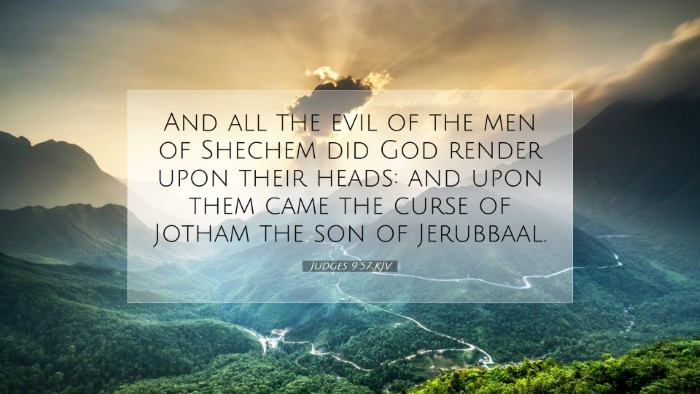Commentary on Judges 9:57
Judges 9:57 states: "And all the wickedness of the men of Shechem did God render upon their heads: and upon them came the curse of Jotham the son of Jeroboam."
Introduction
This verse serves as a conclusion to the tragic narrative surrounding Abimelech, the son of Gideon, and the men of Shechem. It encapsulates the theme of divine retribution and the fulfillment of prophetic curses, highlighting God's sovereignty and justice in dealing with human wickedness.
Insights from Public Domain Commentaries
Matthew Henry's Commentary
Matthew Henry reflects on the divine justice that follows the wickedness of the men of Shechem. He emphasizes that God is not blind to the actions of individuals or communities, and He holds people accountable for their deeds. The verse implies that the evil plotted by the men of Shechem against Jotham and his family would ultimately result in their own downfall.
Henry elaborates that the curse pronounced by Jotham (Judges 9:20) played a significant role in the unfolding events. He notes the solemnity of Jotham’s parable that foretold destruction for the men of Shechem if they would follow Abimelech. The resulting chaos and conflict that consumed Shechem can thus be viewed as a fulfillment of this divine curse.
Albert Barnes' Notes on the Bible
Albert Barnes elaborates on the character of the men of Shechem and their role in the rebellion against Jotham. He notes their unprincipled actions as fundamentally self-serving, driven by ambition and greed. Barnes points out that their rejection of Jotham as leader and embrace of Abimelech, who was indeed a usurper, sealed their fate.
He underscores that the phrase "God rendered upon their heads" indicates a principle of divine justice where God actively ensures that the wickedness they perpetrated is returned to them in kind. This reflects God's overarching control over human affairs and His commitment to moral order.
Adam Clarke's Commentary
Adam Clarke provides a historical and cultural context for the events surrounding Judges 9:57. He discusses the significance of Shechem as a city historically linked to covenant and loyalty. Clarke points out that the men of Shechem, in choosing Abimelech, chose a path of betrayal against their own heritage and against the God of Israel.
Clarke emphasizes that the curse of Jotham serves not only as a prediction but a divine declaration. Its realization is evidenced in the internal strife and ultimate destruction that befell Shechem. Clarke views the calamities that followed as a clear demonstration of God’s judgment, serving as both a warning and an assurance of His justice.
Theological Implications
The events surrounding Judges 9:57 reveal profound theological truths regarding the nature of God, human sin, and the consequences of rebellion against divine authority. These implications serve to illuminate our understanding of God's judgment and mercy.
Divine Justice
The judgment of God, as reflected in the downfall of Shechem, reaffirms the belief that no act of wickedness goes unnoticed. God's rendering of consequences upon the men of Shechem illustrates His justice as integral to His nature. This serves as a reminder that nations and individuals alike will answer for their actions before God.
The Role of Curses and Blessings
In the Hebrew Scriptures, the concept of blessings and curses is significant. Jotham's curse was not merely a spoken word; it had spiritual implications. It demonstrates the belief that the words of a chosen servant of God carry weight in the spiritual realm, resulting in tangible effects in the earthly realm.
God’s Sovereignty
This passage underscores the sovereignty of God over human affairs. The rise and fall of leaders and nations are under His control. Although the men of Shechem acted on their own accord, God was orchestrating events behind the scenes, ensuring that His divine justice prevailed.
Conclusion
Judges 9:57 encapsulates a vital chapter in biblical history, serving as a stark reminder of the repercussions of evil and rebellion against God. The insights gleaned from the commentaries of Matthew Henry, Albert Barnes, and Adam Clarke enhance our understanding of this verse, offering rich theological implications for contemporary readers. As we recount the story of Abimelech and Shechem, may we reflect on the serious nature of covenant fidelity, the consequences of sin, and the ultimate justice of our sovereign God.


